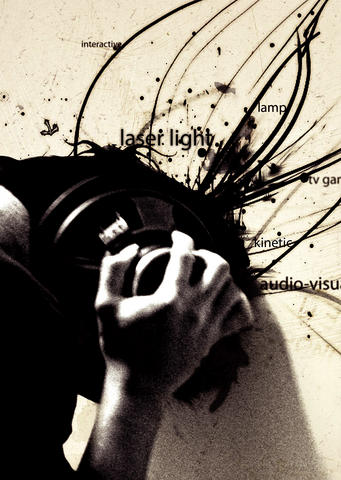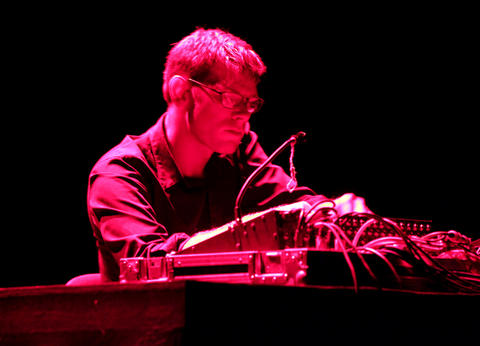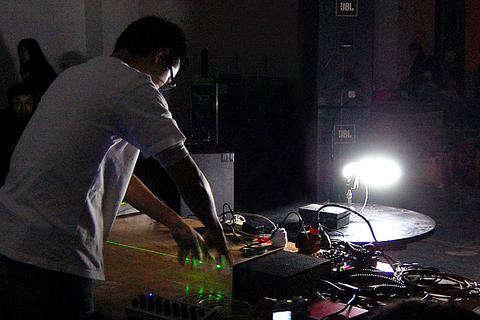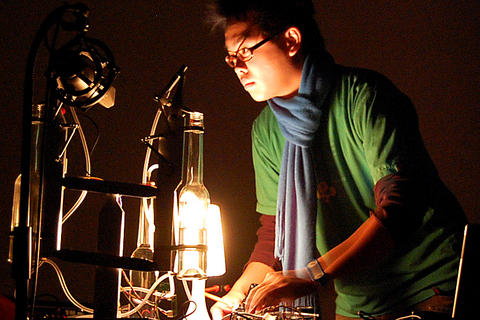Some call it "experimental," some call it "avant-garde" and some call it "sound art."
Others just call it noise.
That's what Fujui Wang (王福瑞), one of Taiwan's biggest proponents of the style, calls it. The tag isn't pejorative. When Wang, who heads the Digital Art Lab and Computer Music Lab at Taipei National University of the Arts (TNUA), started the nation's first, now-defunct experimental music label in 1993, he called it exactly that: Noise.

PHOTO: COURTESY OF TNUA'S TECHART AND JOE COLLEY
Wang and others at the Center for Art and Technology at TNUA have gathered a dozen sound artists for TranSonic 2008, a weekend of performances and artist talks starting tonight at the Guling St Avant-Garde Theatre in Taipei.
Wang and graduate student Yao Chung-han (姚仲涵), who will both perform this weekend, played videos of several artists when I met them in a room brimming with computers, control boards, wires and speakers at TNUA last week.
Normally experimental music brings to mind bleeps and buzzes, TV static and awkwardly silent crowds who burst into nervous applause when each half-hour piece is finally finished, but there's more to it than that.

PHOTO: COURTESY OF TNUA'S TECHART AND JOE COLLEY
Nigel Brown, half of the Changhua- based Taiwanese-Australian duo 12 Dog Cycle, says that sound artists use "the sounds of the world around them, electronic sound, modified or self-built instruments, sounds from the body, silence, household or industrial goods and just about every other sound-producing thing imaginable."
"Most of the artists at TranSonic will use computers, but not all of them," Wang says. "And the sound doesn't usually come from the computer. The computer's just used to process the sounds."
Yao amplifies the sounds of fluorescent lights so you can hear the thumping and crackling of individual electrons slamming into the lights' anodes. Tomorrow night he'll be accompanied by the Taiwanese half of 12 Dog Cycle, Alice Chang (張惠笙), whose vocals range from "tiny textures of crackly breath to ear-shattering screams and everything in between," Brown says.

PHOTO: COURTESY OF TNUA'S TECHART AND JOE COLLEY
In 12 Dog Cycle's pieces, Chang's vocals are layered with sound by Brown, who uses a computer to "spatialize" drones from a piano accordion.
Other artists will use sound from a wide range of sources, including a machine that produces whistles from bottles, a microphone submerged in a giant fishbowl, and insects.

PHOTO: COURTESY OF TNUA'S TECHART AND JOE COLLEY

May 18 to May 24 Pastor Yang Hsu’s (楊煦) congregation was shocked upon seeing the land he chose to build his orphanage. It was surrounded by mountains on three sides, and the only way to access it was to cross a river by foot. The soil was poor due to runoff, and large rocks strewn across the plot prevented much from growing. In addition, there was no running water or electricity. But it was all Yang could afford. He and his Indigenous Atayal wife Lin Feng-ying (林鳳英) had already been caring for 24 orphans in their home, and they were in

On May 2, Chinese Nationalist Party (KMT) Chairman Eric Chu (朱立倫), at a meeting in support of Taipei city councilors at party headquarters, compared President William Lai (賴清德) to Hitler. Chu claimed that unlike any other democracy worldwide in history, no other leader was rooting out opposing parties like Lai and the Democratic Progressive Party (DPP). That his statements are wildly inaccurate was not the point. It was a rallying cry, not a history lesson. This was intentional to provoke the international diplomatic community into a response, which was promptly provided. Both the German and Israeli offices issued statements on Facebook

Even by the standards of Ukraine’s International Legion, which comprises volunteers from over 55 countries, Han has an unusual backstory. Born in Taichung, he grew up in Costa Rica — then one of Taiwan’s diplomatic allies — where a relative worked for the embassy. After attending an American international high school in San Jose, Costa Rica’s capital, Han — who prefers to use only his given name for OPSEC (operations security) reasons — moved to the US in his teens. He attended Penn State University before returning to Taiwan to work in the semiconductor industry in Kaohsiung, where he

President William Lai (賴清德) yesterday delivered an address marking the first anniversary of his presidency. In the speech, Lai affirmed Taiwan’s global role in technology, trade and security. He announced economic and national security initiatives, and emphasized democratic values and cross-party cooperation. The following is the full text of his speech: Yesterday, outside of Beida Elementary School in New Taipei City’s Sanxia District (三峽), there was a major traffic accident that, sadly, claimed several lives and resulted in multiple injuries. The Executive Yuan immediately formed a task force, and last night I personally visited the victims in hospital. Central government agencies and the